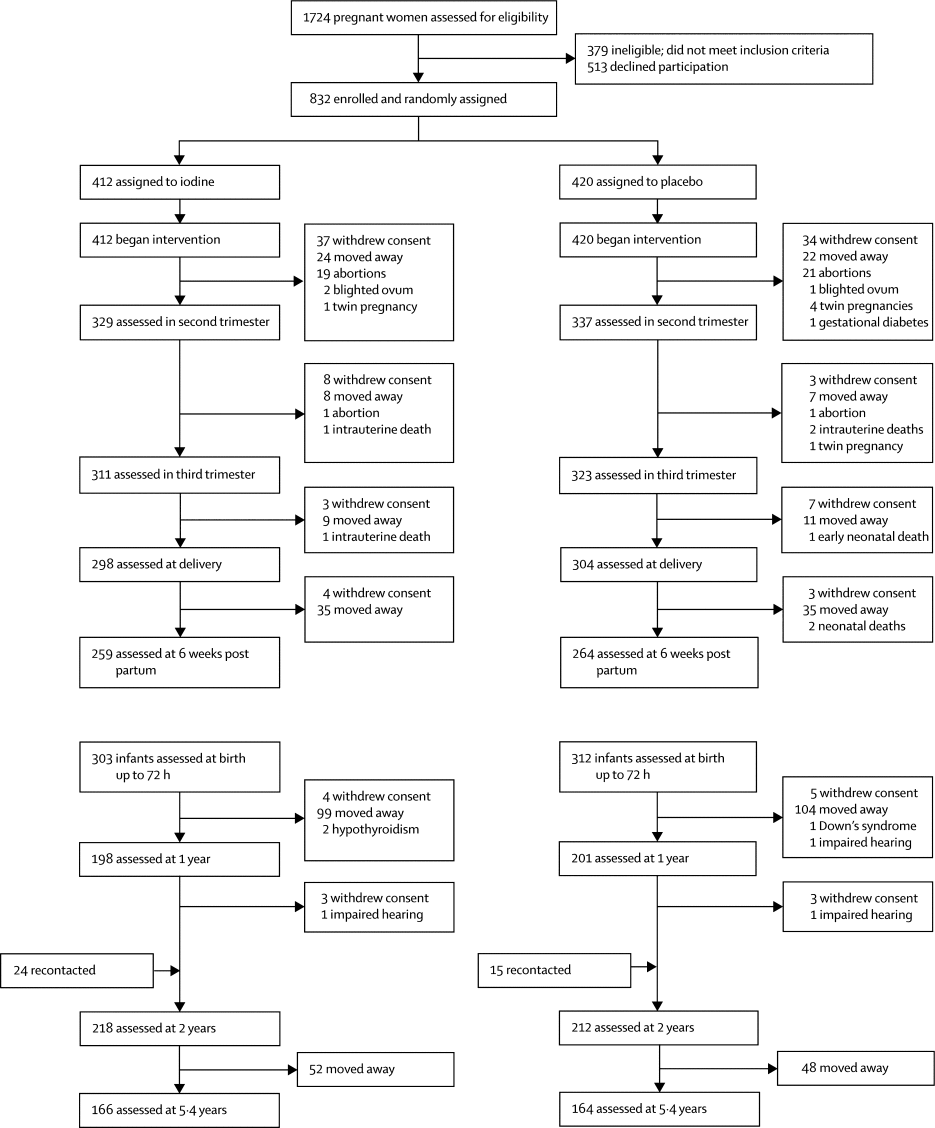The Lancet Diabetes & Endocrinology ( IF 44.0 ) Pub Date : 2017-10-10 , DOI: 10.1016/s2213-8587(17)30332-7 Sueppong Gowachirapant , Nidhi Jaiswal , Alida Melse-Boonstra , Valeria Galetti , Sara Stinca , Ian Mackenzie , Susan Thomas , Tinku Thomas , Pattanee Winichagoon , Krishnamachari Srinivasan , Michael B Zimmermann

|
Background
Iodine deficiency during pregnancy might be associated with reduced intelligence quotient (IQ) score in offspring. We assessed the effect of iodine supplementation in mildly iodine-deficient pregnant women on neurodevelopment of their offspring in areas where schoolchildren were iodine sufficient.
Methods
In this randomised, placebo-controlled trial, pregnant women in Bangalore, India, and Bangkok, Thailand, were randomly assigned (1:1) to receive 200 μg iodine orally once a day or placebo until delivery. Randomisation was done with a computer-generated sequence and stratified by site. Co-primary outcomes were verbal and performance IQ scores on the Wechsler Preschool and Primary Scale of Intelligence Third Edition (WPPSI-III) and the global executive composite score from the Behaviour Rating Inventory of Executive Function-Preschool Version (BRIEF-P) in the children at age 5–6 years. The trial was double-blinded; some unmasking took place at age 2 years for an interim analysis, but participants and nearly all investigators remained masked to group assignment until age 5–6 years. Analysis was by intention to treat using mixed-effects models. This trial is registered with ClinicalTrials.gov, number NCT00791466.
Findings
Between Nov 18, 2008, and March 12, 2011, 832 women entered the trial at a mean gestational age of 10·7 weeks (SD 2·7); median urinary iodine concentration was 131 μg/L (IQR 81–213). Mean compliance with supplementation was 87%, assessed by monthly tablet counts. 313 children (iodine group, n=159; placebo group, n=154) were analysed for verbal and performance IQ with WPPSI-III and 315 (iodine group, n=159; placebo group, n=156) for overall executive function with BRIEF-P. Mean WPPSI-III scores for verbal IQ were 89·5 (SD 9·8) in the iodine group and 90·2 (9·8) in the placebo group (difference −0·7, 95% CI −2·9 to 1·5; p=0·77), and for performance IQ were 97·5 (12·5) in the iodine group and 99·1 (13·4) in the placebo group (difference −1·6, −4·5 to 1·3; p=0·44). The mean BRIEF-P global executive composite score was 90·6 (26·2) in the iodine group and 91·5 (27·0) in the placebo group (difference −0·9, −6·8 to 5·0; p=0·74). The frequency of adverse events did not differ between groups during gestation or at delivery: 24 women in the iodine group and 28 in the placebo group reported adverse events (iodine group: abortion, n=20; blighted ovum, and n=2; intrauterine death, n=2; placebo group: abortion, n=22; blighted ovum, n=1; intrauterine death, n=2; early neonatal death, n=1; and neonatal death, n=2).
Interpretation
Daily iodine supplementation in mildly iodine-deficient pregnant women had no effect on child neurodevelopment at age 5–6 years.
Funding
Swiss National Science Foundation, Nestlé Foundation, Wageningen University and Research, and ETH Zurich.
中文翻译:

孕妇补充碘对儿童神经发育的影响:一项随机,双盲,安慰剂对照试验
背景
怀孕期间的碘缺乏症可能与后代的智商(IQ)得分降低有关。在中学生缺碘的地区,我们评估了碘缺乏症轻度孕妇补充碘对其子代神经发育的影响。
方法
在这项随机,安慰剂对照的试验中,印度班加罗尔和泰国曼谷的孕妇被随机分配(1:1)每天一次口服200μg碘或安慰剂直至分娩。用计算机生成的序列进行随机化,并按位点分层。共同主要结果是韦氏儿童学前和智力量表第三版(WPPSI-III)的口头和绩效智商得分,以及执行功能-学龄前儿童行为评级清单(BRIEF-P)中的全球执行综合得分。 5-6岁的儿童。审判是双盲的。在2岁时进行了一些揭露,以进行中期分析,但参与者和几乎所有研究者都对5-6岁时的小组任务保持掩盖。分析的目的是使用混合效应模型进行治疗。ClinicalTrials.gov,编号NCT00791466。
发现
在2008年11月18日至2011年3月12日之间,有832名妇女以平均胎龄10·7周(SD 2·7)进入试验。尿碘中位数浓度为131μg/ L(IQR 81–213)。根据每月的片剂计数评估,补充剂的平均依从率为87%。使用WPPSI-III对313名儿童(碘组,n = 159;安慰剂组,n = 154)的语言和表现智商进行了分析,对315名儿童(碘组,n = 159;安慰剂组,n = 156)进行了总体执行功能评估。简报 言语智商的WPPSI-III口头智商平均得分为89·5(SD 9·8),安慰剂组为90·2(9·8)(差异-0·7,95%CI -2·9至1·5; p = 0·77),碘治疗组的IQ为97·5(12·5),安慰剂组为99·1(13·4)(差异-1·6,-4 ·5至1·3; p = 0·44)。碘治疗组的BRIEF-P全球高管综合平均评分为90·6(26·2),安慰剂治疗组为91·5(27·0)(差异-0·9,-6·8至5·0 ; p = 0·74)。妊娠期间或分娩时两组之间的不良事件发生频率没有差异:碘组中有24名妇女和安慰剂组中有28名妇女报告了不良事件(碘组:流产,n = 20;卵子枯萎,n = 2;子宫内死亡,n = 2;安慰剂组:流产,n = 22;卵子枯萎,n = 1;子宫内死亡,n = 2;新生儿早期死亡,n = 1;和新生儿死亡,n = 2)。子宫内死亡,n = 2;安慰剂组:流产,n = 22;枯萎的卵子,n = 1;子宫内死亡,n = 2;新生儿早期死亡,n = 1;和新生儿死亡,n = 2)。子宫内死亡,n = 2;安慰剂组:流产,n = 22;枯萎的卵子,n = 1;子宫内死亡,n = 2;新生儿早期死亡,n = 1;和新生儿死亡,n = 2)。
解释
轻度缺碘孕妇每天补充碘对5-6岁的儿童神经发育没有影响。
资金
瑞士国家科学基金会,雀巢基金会,瓦赫宁根大学和研究以及苏黎世联邦理工学院。











































 京公网安备 11010802027423号
京公网安备 11010802027423号